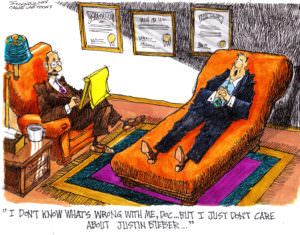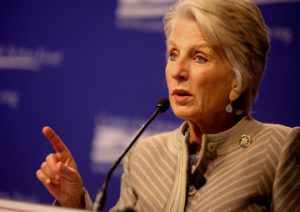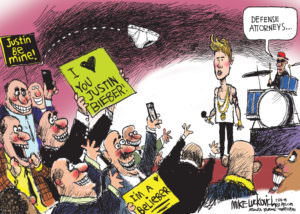The Rise of the ‘Selfie’
The forward-facing camera on smartphones led to an upheaval in the photographic world. Pictures taken of people by themselves are everywhere, and the implications regarding individual vanity, insecurity and interest in the world outside of ourselves are great.
The forward-facing camera on smartphones led to an upheaval in the photographic world. Pictures taken of people by themselves are everywhere, and the implications regarding individual vanity, insecurity and interest in the world outside of ourselves are great.
A search of the hashtag #selfie on the photo sharing service Instagram returned more than 23 million results, while a search for the hashtag #me brought in 51 million, reports Charissa Coulthard at the BBC.
Celebrities remain the most visible culprits. “Rihanna, Justin Bieber, Lady Gaga and Madonna are all serial uploaders of selfies,” Coulthard writes. “Model Kelly Brook took so many she ended up ‘banning’ herself. The Obama children were spotted posing into their mobile phones at their father’s second inauguration. Even astronaut Steve Robinson took a photo of himself during his repair of the Space Shuttle Discovery.”
The word “selfie” is even being considered for inclusion in the Oxford Dictionary Online. One day soon, word processing programs may not laden the term with red error marks that now appear below it when it is typed.
Emily Cook, a 22-year-old Instagram user, comments on the effect such photos can have on one’s self-esteem. “It’s always nice to document a good hair day, or an outfit you love. And generally, especially with Instagram, there’s a real feel-good attitude towards selfies, and as vain as it may be, you know that if you’re not feeling great, there’s someone who will ‘like’ your photo and tell you you’re pretty.”
Dr. Pamela Rutledge, director of the Media Psychology Research Center in Boston, discusses the psychological consequences of constantly viewing oneself. Others look at the trend in terms of the creation of identities people want others to see.
— Posted by Alexander Reed Kelly.
Your support matters…BBC:
According to Dr Rutledge, we enjoy opportunities to experiment with different identities – and the selfie allows just that. “We all want to be able to ‘try’ on a new image and imagine how we would feel as that part of ourselves,” she explains.
According to recent findings from the Pew Research Centre, teenagers in America are sharing more information than ever about themselves on social media. Of those studied, 91% post photos of themselves online – up from 79% in 2006.
… Dr Aaron Balick, a psychotherapist who has written a book about the human motivations behind social networking, explains that we have both “active online identities” and “passive online identities”.
… “A selfie is an expression of an active online identity, something you have some control over. You might take lots, but you’ll publish the ones you like – even if they are silly or unflattering.”
Independent journalism is under threat and overshadowed by heavily funded mainstream media.
You can help level the playing field. Become a member.
Your tax-deductible contribution keeps us digging beneath the headlines to give you thought-provoking, investigative reporting and analysis that unearths what's really happening- without compromise.
Give today to support our courageous, independent journalists.






You need to be a supporter to comment.
There are currently no responses to this article.
Be the first to respond.